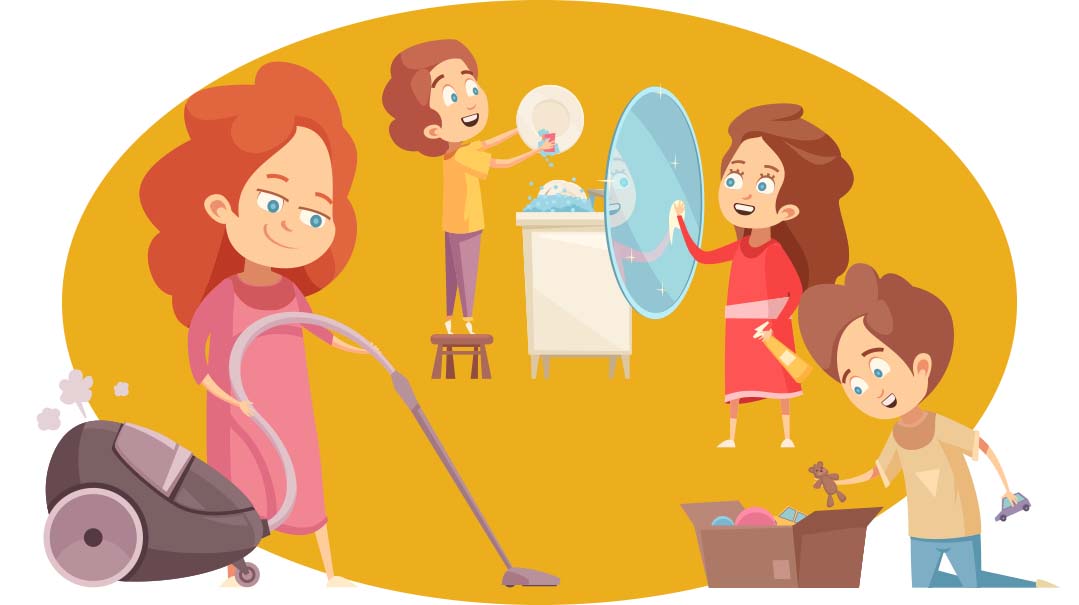A Pitch for Pitching In
| January 25, 2022Can I motivate my kids to do their chores? One woman's valiant quest

Last summer, I shared my week-long experiment to see if I could get my children to eat more vegetables. At this point, my kids are eating about as many vegetables as they were before the experiment — not many. But vegetables do feature in our dinners on a more regular basis, so even if my kids aren’t consuming more, my husband and I are definitely doing a better job at modeling healthy eating.
My children got a kick out of the moderate celebrity status they enjoyed after the last article was published, so when I asked them if they’d be up for participating in another experiment, this time focusing on helping around the house for a full month, they readily agreed.
Facing Reality
Currently, when it comes to helping around the house, my kids are pretty average. They help out when they’re in the mood, but usually they’d rather be doing other things. They don’t have assigned jobs, although there are certain expectations, like keeping their rooms relatively clean (read: picking up clothing off the floor), putting away clean laundry, and clearing their plates from the table when they’re finished.
Even though I’m not losing sleep over it, I’d love for them to help out more. Research indicates that children who have set chores have higher self-esteem, are more responsible, and are better able to deal with frustration and delay gratification.
From a parenting perspective, of course I want that for my children. On a personal level, I’d love to stop muttering, “What do you think I am, your maid?” under my breath and get a little more help around the house.
I faced a couple of main obstacles. One was that there are already so many things I need to get my kids to do, from brushing their teeth to homework to davening, that assigning chores was just not a priority. It was even less of a priority than getting them to eat vegetables.
Another issue is the uncomfortable reality that getting them to actually do chores takes effort on my part. Real, concerted effort, from planning to following through, and in the past, many of my (admittedly half-hearted and poorly executed) attempts to get them to help devolved into nagging and frustration on my end and extensive stalling tactics and kvetching on theirs.
Also, let’s be honest, I do the chores both faster and better.
I reached out to Adina Soclof — a parent educator, professional development instructor, founder of parentingsimply.com, and author of Parenting Simply: Preparing Kids for Life — for her insights.
“It’s long-term parenting,” shared Soclof. “This is not a short-term thing, you have to have the long-term goal in mind, which is that you want them to be helpful people. Your home is the training ground.”
Keeping this goal in mind can help keep the experience positive and also make it more effective, she advises. If the long-term view is that you’re going to teach them the skills to ultimately be responsible in their own homes, it’s helpful to keep in mind that that means they’re going to mess up, a lot, in your home. This is where they’re learning, and we all make mistakes when we learn.
“They do grow up and they do clean their own homes — if it’s important to them,” Soclof told me. She also reminded me that everyone has a different threshold for tolerance to mess, and some people are naturally neater than others — and that’s okay, too.
Planning Realistically
I’d envisioned a well-organized, grand rollout of this experiment, with my children gathered at the kitchen table while I pointed to colorful charts detailing defined expectations and rewards.
That wasn’t how it played out.
Whenever I sat down to work out the details of what we were doing, I got overwhelmed by all the different options of charts and incentives. Predictably, I procrastinated for as long as possible, which meant we started off more haphazardly than I would have liked.
While Soclof acknowledges that “it’s so much better if you’re organized and everyone has their job to do,” she also encourages parents to “try everything.” Figuring out what works is about trial and error; it can be frustrating, but it’s part of the process.
Should the kids do the chores right after school, or do they need downtime? If they wait until after dinner or homework to do their jobs, will they be too tired? Sometimes you won’t know until you’ve tried it both ways a few times.
Soclof also shared that it’s normal to have unrealistic expectations of what and how much our kids are able to do. Comparing the level of kids’ helpfulness today to that of 50 years ago (or comparing it to a neighbor or family member who seems more successful in this area) can make us feel like “why aren’t my kids doing that?”
Soclof recommends building on our children’s strengths, pointing out that children, like adults, are more likely to be motivated by successes. And success breeds success.
“Also,” she advises, “get as much cleaning help as possible.”
After contemplating what actually needs to get done around the house, what my kids are capable of doing, considering their ages (2–13) and their general level of helping experience, I divided their jobs into three categories, making sure to include a number of tasks they were already successfully completing.
This is the list that went up on the kitchen wall (where all important things get posted):
Daily Help
- backpacks, shoes, coats in their place
- dirty laundry put in hamper
- clean laundry in the dresser
- set and clear dinner table
Specific Day Help
- Motzaei Shabbos: pick up the toys in the playroom
- Wednesday night: take out the garbage
- Thursday night: pick up the toys in the playroom
As Needed Help
- load and unload the dishwasher
- bring in groceries from van
- tidy up floor in living area
I also created an adorable/cringe-worthy little rhyme to help with remembering certain daily tasks:
Before you go out to play, are your shoes, coat, and backpack put away?
Before you get to look at a screen, are the dinner table and floors of your rooms clean?
That also got posted on the wall, more to remind me than to remind them.
Communicating Effectively
“You don’t want to give direct commands because kids hate direct commands. It invites power struggles,” says Soclof. She recommends offering them choices instead. Of course, you want both of the choices to work for you, so offer them something along the lines of “Do you want to take out the garbage before or after dinner?”
She also recommends using collaborative communication techniques like asking, “Well, what do you think we should do?” “How do you want to organize this?” and “What’s going to work for you?”
Another tip is to let them know either how many tasks they’re expected to complete or how long it will take. As adults, it helps us to have an end in sight, and kids are the same. Chores that have no endpoint can be very daunting, which makes them hard to even start.
The most formidable task on my family’s chores list was, not surprisingly, the playroom. Playrooms are interesting. On the one hand, I’m so grateful that we actually have space in our home for a room designated just for toys. That’s definitely a luxury. On the other hand, my kids never want to play there unless it’s cleaned, but they also don’t want to clean it up. So most of the time, playing is done upstairs, and the playroom is the messy space I try to avoid looking at on my way to the laundry room.
When the day came to clean the playroom, I took a deep breath and dived in.
“Let’s go downstairs and clean up, just for five minutes,” I suggested to my first-grader (the only child in sight at that moment).
Once we got downstairs, he started the usual litany of “I can’t do it, it’s too hard, I didn’t take these toys out,” but I interrupted him with, “How about you just pick up the toy cars?” Since he’s still relatively easy to motivate, I added, “And let’s see how fast you can do it! I’ll set a timer.”
Before long, all the cars were back in their bin. When he was done, he turned to me and asked, “Mommy, how long is five minutes?” Right. Kids this age don’t really understand time yet. I forgot.
After seeing how effective the request a child only clean up one type of toy worked, as opposed to cleaning for a set (short) length of time, I switched to that technique for the other children once they surfaced, and, to my absolute delight and shock, it worked beautifully.
Soclof recommended using a first/then approach. Pair the thing the child doesn’t want to do (unload the dishwasher) with something they do want to do (play with a friend).
In theory, I love this technique. In practice, I wasn’t so great at remembering to do it.
The second Monday of the experiment, my children put their backpacks away and cleared their bedroom floors before looking at any screens. I was feeling proud at how wonderfully consistent they were about doing those jobs, but then I remembered that no one had unpacked the dishwasher, and I felt a sense of rising panic.
When the children didn’t turn their screens off immediately when I asked, I said impulsively, “Whoever doesn’t turn off nicely has to help with the dishwasher!”
Please, let this be a cautionary tale. Don’t do this.
Consistent but Flexible
The first two weeks of the experiment flew by. Once I saw my children were more accustomed to helping out on a regular(ish) basis, I took stock of what to keep, what to drop, and what to add.
Putting backpacks and shoes away, clearing the table, clearing the floors of their rooms, taking out the trash, and, incredibly, tidying the playroom, were all going strong.
Setting the table wasn’t really happening, and I almost always went grocery shopping when they were in school, so they weren’t around to unload the van. I took both of those off the list. I did want them to help with tidying the floor in the living area and unloading the dishwasher, but I saw that it needed to be a more established routine and not dependent on me asking them to do it.
This meant it was time to make a chore wheel.
Even though Sunday is such a hectic day, I was motivated by the successes of the past two weeks and pushed myself to go get the supplies I needed to create it (if anyone has suggestions about what I’m meant to do with the other 99 paper fasteners from the 100 pack I bought, I’m all ears).
On the chore wheel went four jobs I needed done and thought were feasible:
Unload the dishwasher
Tidy the den
Tidy the living room
Sweep the kitchen floor
I planned to switch the assignments on Sundays and Wednesdays to keep it fresh and manageable.
On Monday, I started unloading the dishwasher out of habit. (It’s not just about training the kids to help, it’s also training myself to give them the opportunity.) I did remember to leave the other one loaded so my son could unload it. When it was time for him to do his job, he asked me hopefully, “I can just take the things out and put them wherever?”
“No, you’ll put them where they go.”
“But I don’t know where they go!” he protested.
“I’ll show you.”
As my son started unloading the dishwasher, my toddler came careening around the corner. “I want to do it! I want to do it!” My poor son got so stressed as his littlest sister started trying to take out the wine glasses and other breakable or sharp items. He took all those out and placed them on the counter, out of reach. But she still insisted on helping.
“It’s cute, but also kind of annoying,” he remarked perceptively.
Thursday was playroom cleaning night, but it was also take out trash night because trash day had been pushed off due to a holiday. I didn’t like asking the kids to do two “big” things in one night, and I toyed with the idea of letting them off the hook for one job. Ultimately, I decided to stick with consistency, and they, more or less, did their jobs.
But after all that, to my dismay, I realized I needed to load the dishwasher again, which meant it needed to be unloaded. The complication was that, in addition to everyone having already helped so much, the child whose job it was to unload the dishwasher is the one for whom helping is the hardest. I had a lot of sympathy for him.
Soclof addresses the reality that children don’t exactly appreciate the benefits of doing chores, and it’s natural and normal for them to complain and resist. “Obviously, they have to do things that they don’t like to do, often,” she explains. “Say to them, ‘Listen, in this house we really try to make things work for you, we want you to do the things that are easier for you, and that you enjoy doing, but there are going to be times where everybody just has to pitch in.’”
She stresses the importance of recognizing and respecting who is more likely to be helpful and who will find it harder. She also advises that “when they do something that they don’t like to do, acknowledge that. It’s so tempting to not empathize with them, to get into the mindset of ‘Well, you have to do it; why are you complaining?’ Instead, say ‘I know you really didn’t want to do that. I so appreciate that you did anyway. Thanks for pitching in.’”
In the past I would have just unloaded the dishwasher myself. It was so easy to see why I could make an exception. But we were on a roll with the children doing their jobs, and I realized that maybe I could push a little more.
“There’s only nine things in the dishwasher,” I attempted to mollify him.
“I don’t care,” was his response as he went down to the basement. I started experiencing some serious Mommy Guilt. Had I grossly miscalculated? But before I could ruminate for long, he emerged from the basement and unloaded the dishwasher!
Praising and Rewarding
While I was feeling very satisfied about how assigning and executing the chores were going, establishing a concrete plan for how I was going to reward my children for their help was more complicated. Initially I didn’t want to pay them an allowance, but rather wanted to develop some sort of alternative reward system.
By the first Motzaei Shabbos of the project, when my 11-year-old asked if they could get an allowance as their reward for helping, I finally accepted that I had neither the time nor the headspace to come up with an alternative reward plan, and it made sense to just pay them cash.
According to the Internet, the going rate is to pay children half their age (my 13-year-old gets $6.50, my nine-year-old gets $4.50, etc). The price point worked for me, but I rarely have cash at all, much less the exact change needed for this kind of payout. Too bad I couldn’t just Zelle them.
After I decided to pay them, it took me until Friday to make it to the bank. When I paid them (at this point, two weeks’ worth of allowance), they were all thrilled, even my first-grader, who I’m pretty sure doesn’t understand the value of money yet. They gave maaser and then ran off to the neighborhood grocery store to spend their money on candy and soda.
In addition to giving a physical reward, Soclof highlights the need for verbal praise. “It’s necessary to give a ton of positive reinforcement. When you get to the Shabbos table, say ‘Oh, my gosh, thank you so much for all your help. I so appreciate it. We worked well together, we’re a good team.”
When we praise our children, not only do they feel good, but it will make it more likely they’ll to repeat the behavior.
After the underwhelming beginning to this experiment and the general lack of previous success in this area in general, I was pleasantly shocked to see how well my kids took to doing the jobs I assigned them.
Yes, there were definitely growing pains, and some funny incidents, like the time I found that the boys had cleared the floor of their room — by stuffing all their dirty laundry in their closet.
But overall, having realistic expectations, learning how to communicate effectively with my children, and keeping the long-term goal in mind created much more success than I anticipated. I saw not only that my children could do this, and that I could do this, but that we could all work together as a team to actually change the dynamic of the household.
And one of the best parts of all this is that I no longer cringe when I walk past the playroom!
(Originally featured in Family First, Issue 778)
Oops! We could not locate your form.






